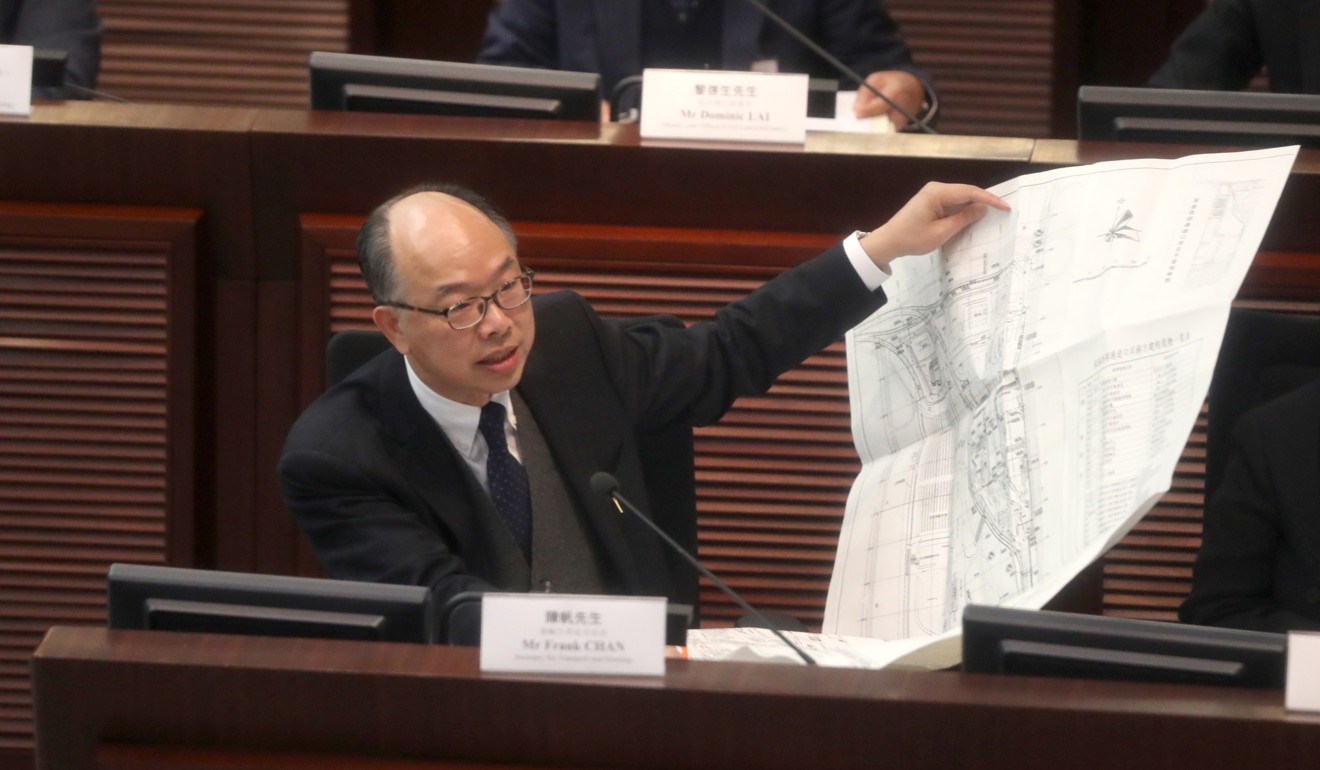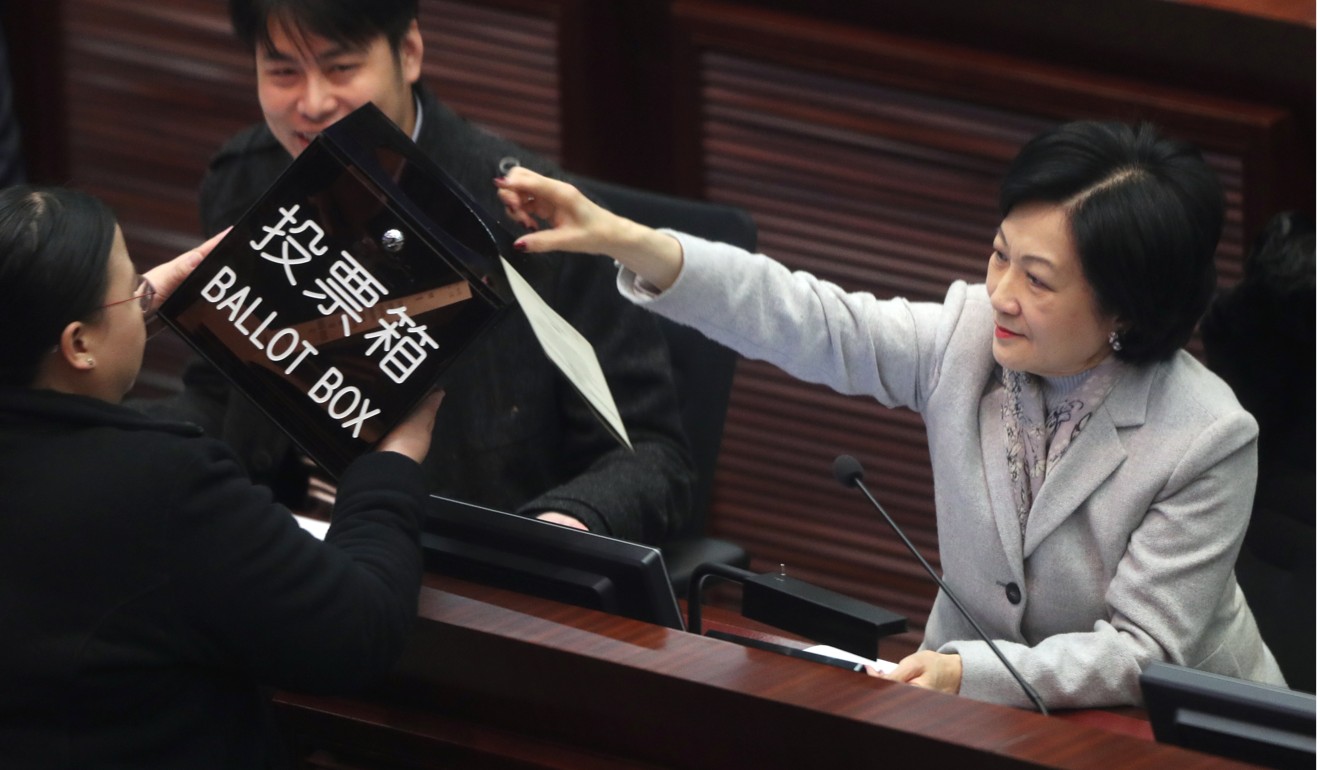
Respect decisions by China’s top legislative body just as we did British authorities, Hong Kong minister urges
Transport secretary Frank Chan Fan defends contentious plans for joint rail checkpoint with mainland China, saying endorsement by National People’s Congress Standing Committee should be adhered to
Hong Kong’s transport minister was on Monday criticised for comparing China’s top legislative body with Britain’s Privy Council during a grilling in the city’s legislature over plans for a controversial cross-border rail link to the mainland.
Secretary for Transport and Housing Frank Chan Fan was also slammed by lawmakers for suggesting a Legislative Council bills committee scrutinising the plans should finish its work in just two and a half months.
The committee on Monday kicked off discussion of a bill for a contentious joint checkpoint for the high-speed rail line. The immigration and customs facility is to be based at West Kowloon in Hong Kong but shared between local and mainland Chinese authorities.
Chan said an endorsement given in December for the checkpoint from China’s National People’s Congress Standing Committee should be respected, just as decisions by the Privy Council were back in colonial times.

The express rail link to Guangzhou is scheduled to begin operating in the third quarter of this year. However, opposition pan-democrat lawmakers and legal professionals in Hong Kong have blasted the arrangement, saying it diminishes the city’s autonomy by having mainland Chinese officers operate on Hong Kong soil.
Hong Kong lawmakers primed for showdown over joint checkpoint plan as 60 of 64 Legco members sign up for key committee
They have demanded the government explain how the arrangement does not breach Article 18 of the Basic Law, Hong Kong’s mini-constitution, which states that no national laws shall be enforced in Hong Kong unless they are added to Annexe III.
On Monday Chan said lawmakers should scrutinise the bill “rationally and pragmatically” so it could be approved by Legco before its summer recess starts in mid-July.
“For the Shenzhen Bay checkpoint, this work was done in two and a half months. If we really do this seriously and diligently, without other considerations, I believe that same time frame should be sufficient,” Chan said.
He was referring to a bill approved a decade ago to set up a joint checkpoint in Shenzhen, on the other side of the border, for the Western Corridor, a 5.5km bridge to the city opened in 2007.
Hong Kong firefighters to act first and seek clearance later in emergencies at high-speed rail joint checkpoint
Pan-democrats argued the Western Corridor case was much simpler because it did not involve applying mainland laws in Hong Kong territory.
Pro-establishment lawmaker Alice Mak Mei-kuen asked what would happen if the bill was not approved in time.

“The starting day for the railway’s operation will be postponed indefinitely,” Chan answered.
Pan-democrat legislator Raymond Chan Chi-chuen asked what the government would do if the so-called “co-location” bill was ruled unconstitutional by a local court.
Frank Chan did not respond directly to that question, but suggested people should respect the endorsement given for the checkpoint by the NPC Standing Committee, China’s top legal authority.
He said NPCSC judgments should be respected just as those by London’s Privy Council were back in Hong Kong’s days as a British colony.
Hong Kong courts can challenge government’s bid to write joint checkpoint into law, says justice minister
The Privy Council is a body of advisers to the British sovereign but also formerly acted as the High Court of Appeal for the entire British Empire.
“In those days if we filed an appeal against a decision and the Privy Council made a judgment, we would respect it,” he said. “Now, the NPCSC, if we consider it as an equivalent of the Privy Council, has also made a judgment.”
Watch: all you need to know about the Hong Kong-mainland rail link
But Raymond Chan countered that this comparison was inappropriate as Hong Kong enjoyed the power of final adjudication under current constitutional arrangements, and the city’s Court of Final Appeal was the city’s top court.
Monday’s meeting started with pro-establishment lawmakers Regina Ip Lau Suk-yee and Horace Cheung Kwok-kwan elected chairwoman and vice-chairman of the bills committee.
Ip revealed that there would be a visit on February 27 for lawmakers from both sides of the political divide to visit the West Kowloon terminal.
Hong Kong Law Society warns lack of clarity on joint rail checkpoint could undermine ‘one country, two systems’
Secretary for Justice Teresa Cheng Yeuk-wah was asked at the meeting if she would accept a challenge from the newly elected chairman of the Hong Kong Bar Association, Philip Dykes, to debate the merits of the checkpoint. Dykes has raised doubts about its legality.
“A debate might not be the best way to handle the matter,” Cheng said. “It would only cause opinions on both sides to become more polarised.”
The committee meeting was convened after a senior assistant legal adviser to Legco wrote to the Transport and Housing Bureau on Friday asking for clarification on 20 constitutional and legal questions related to the checkpoint bill.
Civic Party lawmaker Tanya Chan said it was “uncommon” for Legco’s legal service division to identify such a large number of questions on a government bill.
“It shows that co-location is not just a transport issue,” she said. “It is the biggest constitutional crisis facing Hong Kong.”

